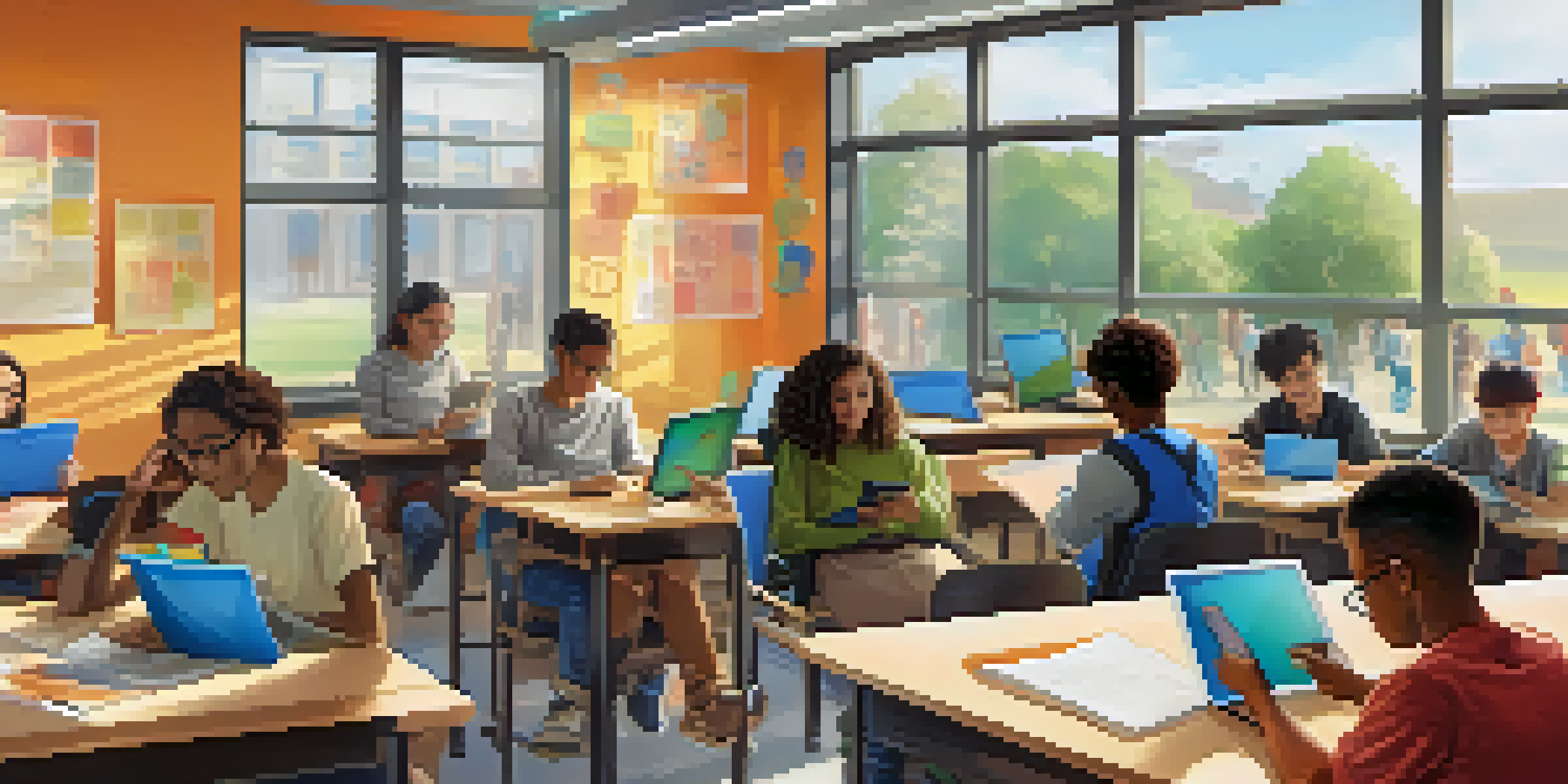Innovative Assessment Techniques for Mobile Learning Environments

The Shift to Mobile Learning and Assessment
Mobile learning is revolutionizing education, making it more accessible and flexible. With the rise of smartphones and tablets, learners can now access materials anytime, anywhere. This shift has also prompted educators to rethink traditional assessment methods, adapting them to fit the mobile context.
Mobile learning is not just a trend; it's a fundamental shift in how we approach education, making learning more accessible and personalized.
In a mobile learning environment, assessments need to be concise and engaging. Long tests can be overwhelming on small screens, so innovative techniques are essential. For instance, short quizzes and interactive polls can capture learner engagement while providing instant feedback.
Moreover, mobile assessments can leverage multimedia elements like videos and graphics. This not only caters to different learning styles but also makes the assessment process more enjoyable and effective. As we explore further, we'll look at specific techniques that are making waves in mobile assessments.
Gamification: Making Assessment Fun and Engaging
Gamification is an innovative way to spice up assessments in mobile learning. By incorporating game-like elements such as points, badges, and leaderboards, educators can motivate learners to engage more deeply with the material. This approach fosters a sense of competition and achievement, which can be particularly effective for younger audiences.

For example, a mobile app might allow students to earn points for completing quizzes or participating in discussions. These points can lead to rewards, encouraging continuous engagement. By framing assessments as games, students may feel less pressure and more excitement.
Mobile Learning Enhances Accessibility
Mobile learning makes education more flexible and accessible, allowing learners to engage with materials anytime, anywhere.
Furthermore, gamified assessments can provide real-time feedback. Learners can see their progress instantly, allowing them to identify areas needing improvement. This immediate response creates a dynamic learning experience, bridging the gap between assessment and learning.
Peer Assessment: Collaborative Learning Through Feedback
Peer assessment is a technique that harnesses the power of collaboration in mobile learning environments. By allowing learners to evaluate each other's work, students can gain diverse perspectives and insights. This process not only enhances understanding but also builds critical thinking skills.
Gamification in education is about transforming learning into a game, creating an environment where engagement and enjoyment go hand in hand.
Mobile platforms are particularly suited for peer assessment, enabling easy sharing of work through apps or online forums. Students can submit their assignments and provide feedback to their peers directly from their devices. This flexibility fosters a sense of community among learners.
Moreover, peer assessment encourages accountability. When students know their work will be reviewed by classmates, they are likely to put in more effort. This collaborative approach transforms assessment from a solitary task into a shared learning experience.
Adaptive Assessments: Tailoring to Individual Learner Needs
Adaptive assessments are a game-changer in mobile learning, allowing evaluations to adjust based on learner performance. This personalized approach means that if a student struggles with a topic, the assessment can provide easier questions to help build confidence. Conversely, those who excel can be challenged with more difficult material.
For instance, an adaptive quiz might start with general questions and, depending on the answers, dynamically adjust its difficulty. This ensures that every learner is engaged at their level, making the assessment experience more relevant and effective.
Gamification Boosts Student Engagement
Incorporating game-like elements into assessments motivates learners and fosters a sense of achievement.
Additionally, adaptive assessments can save time for both learners and educators. By focusing on each individual's needs, these assessments can quickly identify strengths and weaknesses, leading to more targeted interventions. This not only enhances learning outcomes but also fosters a more individualized educational experience.
Micro-Assessment: Short and Frequent Engagements
Micro-assessments are a popular trend in mobile learning, emphasizing short, frequent evaluations over lengthy exams. These bite-sized assessments can take the form of quick quizzes, flashcards, or even interactive games. They allow learners to check their understanding regularly without feeling overwhelmed.
The beauty of micro-assessments lies in their flexibility. Learners can complete them during short breaks or while commuting, making it easier to incorporate learning into their daily routines. This approach not only reinforces knowledge but also maintains engagement over time.
Moreover, micro-assessments can provide immediate results, allowing learners to see their progress in real-time. This instant feedback can be highly motivating, helping students stay on track with their learning goals. Overall, micro-assessments are a practical solution for busy learners in a mobile context.
Using Multimedia for Diverse Assessment Formats
Integrating multimedia elements into assessments can greatly enhance learner engagement and comprehension. In mobile learning environments, this can include videos, podcasts, infographics, and interactive simulations. These diverse formats cater to various learning styles and keep assessments fresh and exciting.
For instance, instead of a traditional essay, learners might create a video presentation or an infographic to demonstrate their understanding of a topic. This not only allows for creativity but also encourages deeper engagement with the material. Mobile platforms make it easy to share and assess these multimedia projects.
Adaptive Assessments Personalize Learning
Adaptive assessments tailor evaluations based on individual learner performance, ensuring relevance and effectiveness.
Additionally, multimedia assessments can simulate real-world scenarios, providing learners with practical experience. This hands-on approach can be particularly beneficial in fields such as healthcare or engineering, where applying knowledge is crucial. By embracing multimedia, educators can create assessments that are both effective and enjoyable.
Formative Assessment: Continuous Feedback and Improvement
Formative assessment is all about the process of learning rather than just the end result. In mobile learning environments, this technique allows educators to gather ongoing feedback from learners. By using tools such as polls, surveys, and discussions, instructors can gauge understanding and make necessary adjustments to their teaching strategies.
For example, a teacher might use a mobile app to conduct quick polls after each lesson, checking in on students' comprehension. This continuous feedback loop ensures that learners are supported throughout their educational journey. It also empowers educators to address challenges promptly.

Moreover, formative assessments foster a growth mindset among students. When learners understand that assessments are opportunities for improvement, they may feel more comfortable taking risks. This shift in perspective can lead to greater engagement and a more positive learning experience overall.
The Future of Assessments in Mobile Learning
As mobile learning continues to evolve, so too will assessment techniques. The integration of artificial intelligence and machine learning holds exciting potential for creating even more personalized learning experiences. Future assessments may adapt in real-time, responding to learners' needs as they progress.
Moreover, the growing emphasis on data analytics will enable educators to gain deeper insights into student performance. By analyzing trends and patterns, instructors can tailor their teaching methods and assessments for maximum impact. This data-driven approach promises to enhance the effectiveness of mobile learning.
Ultimately, the future of assessments in mobile learning is bright. With innovative techniques that prioritize engagement and personalization, learners can expect a more meaningful and effective educational experience. As we embrace these changes, the possibilities for learning are limitless.